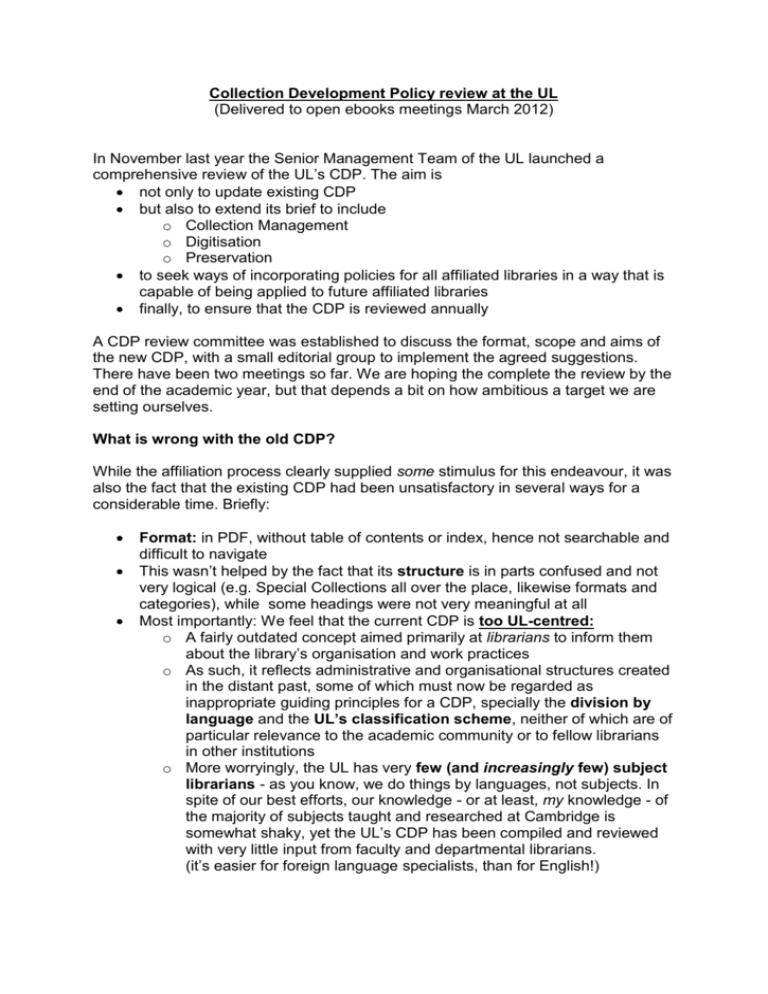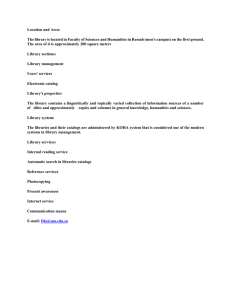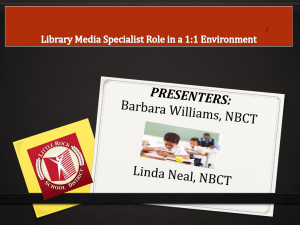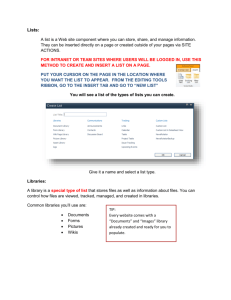Collection Development Policy review at the UL (Delivered to open
advertisement

Collection Development Policy review at the UL (Delivered to open ebooks meetings March 2012) In November last year the Senior Management Team of the UL launched a comprehensive review of the UL’s CDP. The aim is not only to update existing CDP but also to extend its brief to include o Collection Management o Digitisation o Preservation to seek ways of incorporating policies for all affiliated libraries in a way that is capable of being applied to future affiliated libraries finally, to ensure that the CDP is reviewed annually A CDP review committee was established to discuss the format, scope and aims of the new CDP, with a small editorial group to implement the agreed suggestions. There have been two meetings so far. We are hoping the complete the review by the end of the academic year, but that depends a bit on how ambitious a target we are setting ourselves. What is wrong with the old CDP? While the affiliation process clearly supplied some stimulus for this endeavour, it was also the fact that the existing CDP had been unsatisfactory in several ways for a considerable time. Briefly: Format: in PDF, without table of contents or index, hence not searchable and difficult to navigate This wasn’t helped by the fact that its structure is in parts confused and not very logical (e.g. Special Collections all over the place, likewise formats and categories), while some headings were not very meaningful at all Most importantly: We feel that the current CDP is too UL-centred: o A fairly outdated concept aimed primarily at librarians to inform them about the library’s organisation and work practices o As such, it reflects administrative and organisational structures created in the distant past, some of which must now be regarded as inappropriate guiding principles for a CDP, specially the division by language and the UL’s classification scheme, neither of which are of particular relevance to the academic community or to fellow librarians in other institutions o More worryingly, the UL has very few (and increasingly few) subject librarians - as you know, we do things by languages, not subjects. In spite of our best efforts, our knowledge - or at least, my knowledge - of the majority of subjects taught and researched at Cambridge is somewhat shaky, yet the UL’s CDP has been compiled and reviewed with very little input from faculty and departmental librarians. (it’s easier for foreign language specialists, than for English!) I am not suggesting that any staff in particular are to blame for this situation – the fault is, in my view, a structural one. So, how far have we got in our deliberations? New format: HTML / web-based, fully searchable and easy to navigate New structure: o There will be a general CDP covering the UL and its Dependent Libraries, including all non-subject specific matters, as well as a section on Collaborative CD, giving prominence to the JCS and the ebooks@cambridge Service. Then there will be a o Link to Special Collections, and a o Link to subjects in which materials are collected Now, the subject section is the one where there will be the greatest change. We are currently drawing up a thesaurus/list of subjects which reflects most closely the subjects taught and researched at Cambridge, as well as the libraries supporting these. The aim is to produce a combined CDP for each subject covering both the UL and the relevant Fac/Dept library (libraries), as well as referring to related collections in other libraries. (At Oxford they have a similar scheme in place which seems to work very well – though it is not applied consistently). Now obviously, the affiliated libraries will be part of this new CDP, but it would be great if we could somehow get all the Fac/Dept libraries to participate. The exact format of the subject CDPs and the methology of involving the Fac/Dept libraries needs to be thought about carefully. Let me reassure you that every effort will be made to minimise the work required for you, but we hope that you will be prepared to participate in this venture. Such a scheme, if successful, has several strengths: Greater transparency for all stakeholders, i.e. all librarians and the wider academic community in the University; easier to see what is collected where; where collection responsibilities lie. We are hoping to achieve a more integrated collection development at Cambridge by giving Fac&Dept librarians a greater say in what is collected at the UL, as well as avoiding potential duplication (tapping into subject expertise ‘out there’) Finally, collection building will be more focused on the real needs for teaching and research, rather than on assumed needs. In short, the revised CDP could become a useful tool in driving forward the General Board’s strategy for Teaching and Learning Support Services. So, how do ebooks fit in with all this? Clearly, with an increasing market in and demand for ebooks, decisions about the most appropriate format are essential and need to feature in the CDP. It would be nice to have clear-cut criteria for purchasing ebooks rather than print, or when to purchase one in addition to the other. Some university libraries have opted for ordering ebooks by default where titles are published in both formats. Others have gone a step further and adopted PDA for all or part of their budget. Unfortunately, decisions about ebooks are much less straightforward for the UL than for Fac/Dept&College libraries: For a research library, those areas where a strong case can be made for ebooks, i.e. multiple copies, short loan collections, textbooks, are less relevant. And of course, ebooks are more costly than print (VAT), so does it make sense to pay more for titles that are likely to used only occasionally? On the other hand, the additional cost will in part be offset by a reduction in processing costs at the UL (cataloguing??, binding, labelling, classification, shelving, circulation, repair etc.) It is therefore essential to have clear guidelines/criteria for acquiring electronic rather than print. Two examples: a. if the book is of a textbook or reference-type nature (many ‘handbooks in…’) but can’t be ordered through the ebooks@cambridge Service, or b. if there is likely to be a strong interdisciplinary demand for it. To PDA or not to PDA? I have mentioned PDA. Many university libraries have taken a step further and adopted PDA for all or part of their book budget. This is indeed an extremely attractive model (no need to rehearse the arguments in its favour here. Also, it is worth mentioning that PDA can be employed for both print and electronic books). We are currently looking into this, but again have to negotiate several obstacles that are unique to a research library and to the Cambridge situation (and this is without even looking at attendant ebook records and database issues): 1. Traditionally, the responsibility of a research library has been to collect research materials of intrinsically valuable content. The ‘just in time’ principle is therefore a less pressing one. We need to consider seriously to what extent the UL needs to continue to fulfil this role of a research repository and collect ‘just in case’. In the future, as more and more scholarly titles are being published electronically, books may no longer go out of print, and this issue may well disappear. 2. The UL is a Legal Deposit library. Predicting what will be received by LD is not straightforward and needs to be monitored constantly. Thus, populating LibrarySearch with thousands of bibrecords for books, of which a very large proportion is likely to be received free of charge, is at the very least worth thinking about. Are there ways round this? a. Only use PDA selectively, i.e. for publishers that don’t come Act (Springer, De Gruyter, Peter Lang, Brill and others that publish e+p) b. A more radical approach would be to allow readers to select even from LD publishers. After all, we do currently acquire ebook packages from UK publishers, and Fac&Dept libraries have to purchase these titles if they need them. There may have to be a reconsideration of resource allocation university-wide, though, as the UL can not be expected to foot the bill for so many titles that would traditionally have been acquired by Fac/ Dept&College libraries. This brings me to the third obstacle: 3. Unlike most universities, we do not have a centralised library administration at Cambridge. In most universities, library funds are centrally administered using a resource allocation formula for each subject (only works to a certain extent as many books interdisciplinary!). With the current set-up of library services at Cambridge it will be a lot more complicated to set up PDA on a comprehensive scale – it certainly would require some creative thinking. So, there is much to think about. I am sorry if I am presenting to you more questions than answers, but I thought it would be useful for you to gain a better understanding of the UL’ perspective. There are many obstacles, but that does not mean that they cannot be overcome with some creative thinking GHW, March 2012. .







